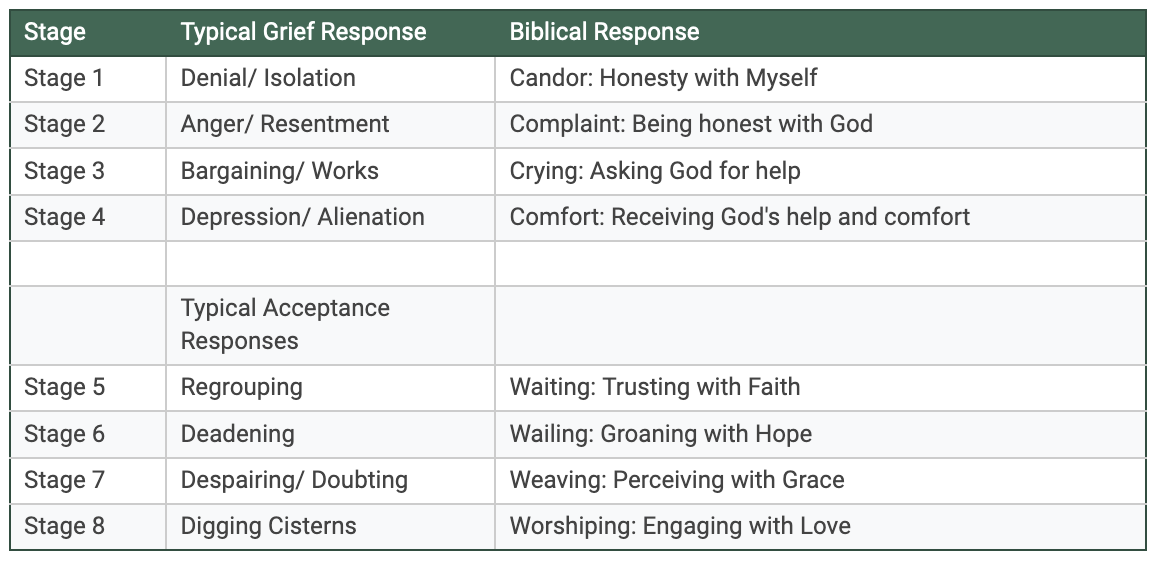In my years of working with clients through their bereavement journey I have found that it is often quite helpful for those grieving to have a model of which to see and understand the rollercoaster of emotions they are on. My goal is to cover a few of these models. I hope that they give you an opportunity to understand your journey a little better or give you comfort in knowing that you are not alone. What you are going through is quite expected and maybe even good. Not that grieving feels good, or that what happened is good, but good because when you experience a loss it is good to be able to grieve. Grieving is the body, mind and spirit’s way of reacting to the immense loss that one feels from the death of a loved one. And remember, as you go on this journey that though you’re not alone, not a single person is going to grieve in the exact way you will. Even those experiencing a loss of the same person will not grieve the same. Give yourself and others space to experience yours/their loss in a unique way, because there is no right or wrong way to grieve.
Kubler-Ross Stages of Grief
This model was made famous by Kubler-Ross’s book “On Death and Dying” published in 1969. So it has been around a while. It was originally focused on the process that patients experience as they go through the dying process, and expanded to cover how others react to the loss after a loved one as well. The 5 stages are as follows.
- Denial– a method of coping in which the person rejects the reality of the situation.
- Anger– As reality sinks in it is common for anger to be felt.
- Bargaining– a way of trying to take control of the illness or the grief. The bargains could be rational or it could be magical thinking, or caused by a subliminal guilt. Some may even make unspoken bargains with the Lord.
- Depression– While the other stages listed before may be less expected, this is the most expected and understood stage of grief. In this stage overwhelming sadness, fatigue, and feelings of loss are all encompassing. It is also the stage of grief that may bring the most fear. Often people fear falling into this complete sadness and being unable to climb their way out.
- Acceptance– The final stage of grief in which the person recognizes the loss and difficulty it will bring but no longer fights against the process. There may come a glimmer of hope that they will begin to feel joy in life once again.
These stages are wonderful but most often when this model is criticized it is because it is too linear. Keep in mind that grief in general and specifically this model is less of a linear process and more of a roller coaster. At one point you may feel denial and at another you may feel depression, you may experience the high of acceptance only to hit the bottom of denial once again. There is no way of predicting the course of your grief journey. Often people can also experience more than one stage at the same time.
Let’s move on to the next model of grief…
Wolfelt’s Model of Grief
Wolfelt’s model of grief is less of a diagram of what to expect and more of a path to healing. He sees grief as a journey that must be walked in order to heal and he identifies 6 steps to healing. The person begins to take their grief and incorporate it into their continued life. For a description of each step see more here: https://www.centerforloss.com/2023/12/journey-grief-six-needs-mourning/
- Acknowledge the death
- Embrace the pain and loss
- Remember the person who died
- Develop a new identity
- Search for meaning
- Receive ongoing support from others
I really like Wolfelt’s model because it encourages people to express their grief and partner with others on their journey and grow close to others during this hard time.
Wolfelt also has great material walking with someone through their grief journey, what he termed “Companioning the Bereaved” for more information you can look here. https://www.centerforloss.com/2019/12/eleven-tenets-of-companioning/
Biblical Response to Grief
Lastly, I want to cover what I would call a Biblical view of grief. This is not to say that either of the ones previously mentioned are not necessarily Biblically supported. But, the previous models seek to describe what happens from an observed human level, they do not describe what grief should look like from a Biblical-based ideal and how to interact with the Lord through it. This model specifically comes from scripture itself and what we see described in the Bible.
For more information on this model refer to Robert W. Kellemen’s book “God’s Healing for Life’s Losses: How to Find Hope When You’re Hurting”.
These are just a few models of grief that I have found most helpful. So, as you go through your grief journey remember there are numerous models of grief that will help guide and validate your experience. If you are walking through grief and are struggling to have the support of someone nearby or feel that hope has been hard to come by please reach out to a local mental health counselor in your area. As always, if you are a woman interested in counseling who has experienced a loss of some kind and living in the state of NC I’d love to talk with you and see if counseling is a good fit. Fill out the contact form on the website.

For more information on this model refer to Robert W. Kellemen’s book “God’s Healing for Life’s Losses: How to Find Hope When You’re Hurting”.
These are just a few models of grief that I have found most helpful. So, as you go through your grief journey remember there are numerous models of grief that will help guide and validate your experience. If you are walking through grief and are struggling to have the support of someone nearby or feel that hope has been hard to come by please reach out to a local mental health counselor in your area. As always, if you are a woman interested in counseling who has experienced a loss of some kind and living in the state of NC I’d love to talk with you and see if counseling is a good fit. Fill out the contact form on the website.
Considering Tele-therapy?
Christian Mom Counseling provides professional counseling via virtual teletherapy for women located in the state of North Carolina. We utilize real-time video to have sessions with women all over the state of NC. There are multiple reasons why and here are a few:
- As a mom of three, I understand the difficulty of scheduling and making time for myself. I’ve found that many other mothers who are in the early childhood stage of motherhood find scheduling online sessions easier and more feasible. Save time on travel and sitters and schedule online.
- You can attend your session even if you are sick without the risk of exposing anyone else!
- It’s a good option if you live in a remote area that makes finding a counselor close to you difficult.
- My primary specialty is faith-based Christian Counseling. That being said, many of my clients have commented on their inability to find counselors who claim to be Christian and include faith as a major part of the client’s healing and recovery.
- Virtual Counseling is here to stay and studies have shown that in many cases tele-therapy can be equally as effective. You will always hear me recommend in person interpersonal connections (family, friends, church, small groups, and other forms of deep relationships with others) but online counseling can provide many of the same advantages of in-person counseling.
If you’ve been wondering if tele-therapy would be a good fit I’d love to hear from you! Click the button below to form to schedule a free phone consultation:


